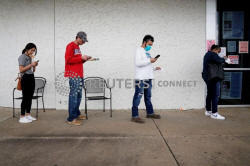As U.S. jobless claims surged in March, some states
lagged with payments
 Send a link to a friend
Send a link to a friend
 [May 01, 2020] By
Jonnelle Marte [May 01, 2020] By
Jonnelle Marte
(Reuters) - Fewer than one in five
Americans who filed for unemployment benefits in March received their
first payments before the month was over, shedding light on how states
struggled to distribute initial benefits after facing an unprecedented
wave of claims caused by the coronavirus.
Nationally, just 14.21% of the nearly 12 million people who filed
initial jobless claims in March received their first payments that same
month, according to Labor Department data released this week.
In some states, the share of people receiving benefits was significantly
lower, showing that newly jobless Americans in some parts of the country
are facing much longer waits for benefits than others.

"They are struggling with the demand and that is very frustrating to
people," said Andrew Stettner, a senior fellow at The Century
Foundation, which published an analysis on the state trends on
Wednesday. "This data gives you a sense of it."
Under federal rules, states have up to three weeks to make initial
payments from the time a claim is filed, Stettner said. Since many
states did not put lockdowns or stay-at-home orders in place until mid-
to late March, it's possible some states caught up with payments in
April.
In Indiana, Arizona, Minnesota and Florida, less than 3% of people
filing claims for the first time in March had received payments that
month, which could cause them to understate the number of jobless people
in the state by some estimates.
Rhode Island, in contrast, paid benefits to 51% of the 60,000 people who
filed initial jobless claims in March. West Virginia and Virginia were
close behind, paying benefits to about half of workers who filed claims.
More than 30 million Americans have filed for unemployment benefits
since March 21. The sheer volume of claims has overwhelmed some state
filing systems, which were not built to process such a high volume of
applications.
(Graphic: Unemployment rolls surge in many states -
https://fingfx.thomsonreuters.com/
gfx/mkt/dgkvlgxnrpb/
Pasted%20image%201588276517253.png)
[to top of second column] |

People who lost their
jobs wait in line to file for unemployment following an outbreak of
the coronavirus disease (COVID-19), at an Arkansas Workforce Center
in Fayetteville, Arkansas, U.S. April 6, 2020. REUTERS/Nick Oxford

State labor departments are hiring additional staff to help process claims and
answer questions. States are also revamping their websites and trying to manage
the traffic by asking people to file claims on certain days of the week based on
their names.
Still, a survey by the left-leaning Economic Policy Institute found that for
every 10 people who have successfully filed unemployment claims, three or four
people have been unable to register and another two people have not tried to
apply.
In recent years, several states have cut unemployment benefits and made it more
difficult for people to apply. "They've been more throwing up barriers to people
getting assistance," said Stettner.
Other factors may also be at play. For example, some states with smaller
populations, such as Rhode Island, may have an easier time processing claims
than states with more people, he said.
The states that are having trouble processing claims may also be undercounting
the number of people who have lost jobs, by some measures. Consider the insured
unemployment rate, which measures what share of the total labor force is
receiving unemployment benefits.
Florida, for example, had an insured unemployment rate of 2% as of mid-April,
but it was also severely behind in processing claims as of March - making
payments to only 2.4% of people who filed initial claims that month. Rhode
Island, which paid benefits to more than half of people filing claims in March,
had a higher insured unemployment rate of nearly 17%.

(Graphic: But the picture is uneven -
https://fingfx.thomsonreuters.com/
gfx/mkt/bdwpkraxmvm/Pasted%20image%201588276032043.png)
(Reporting by Jonnelle Marte; Editing by Dan Burns and Aurora Ellis)
[© 2020 Thomson Reuters. All rights
reserved.] Copyright 2020 Reuters. All rights reserved. This material may not be published,
broadcast, rewritten or redistributed.
Thompson Reuters is solely responsible for this content. |